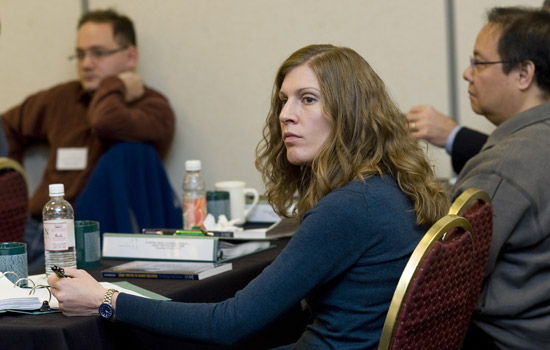‘Boot Camp’ takes aim at preparing quality grant proposals
A. Sue Weisler
Susan Smith, assistant professor of biological and medical sciences, listens in on dialogue at this year’s Grant Writers’ Boot Camp. Nearly two dozen RIT faculty and staff members took part in the two-day experience.
Call it “basic training” for RIT’s new principal investigators. Sponsored Research Services teamed up with the Wallace Center to offer the university’s annual Grant Writers’ Boot Camp Nov. 22-23.
Nearly two dozen faculty and staff took part in the event at the RIT Inn and Conference Center, all looking for insights on the fundamentals of securing external research funding. During his introduction to the two-day workshop, David Bond, director of Sponsored Research Services, emphasized the importance of high quality, well-written proposals.
“Funding is tight,” he said, “and it may well get tighter for a few years. Excellence in the written presentation really has to be the new norm if you’re going to succeed.”
The opening session featured a panel discussion on the vision for research at RIT. President Bill Destler was joined by Jeremy Haefner, provost and senior vice president for academic affairs, and Donald Boyd, vice president for research, to emphasize the mission of scholarship and research on campus.
“We’re trying to build a richer intellectual climate for our faculty, students and staff and to ensure that our students, as they go through the R&D experience, have that wonderful experience associated with tackling problems that haven’t been solved or where the answers are not in the back of the book,” explained Destler.
“I think what’s most important is that our work in research, scholarship and creative work remains impactful—that it has meaning,” added Haefner. “We value the kind of work that has broad significance and changes people’s lives.”
Boyd urged participants to become familiar with the various funding agencies and to understand each agency’s specific interests before submitting a grant proposal.
“You need to think like an entrepreneur,” he stated. “If you’re an entrepreneur, you have a product that you’re trying to convince other people to spend money on. That product is your scholarship and research. It’s your problem or question that you’re trying to answer, and you have an approach to do that. So you have to understand what that is. If you don’t, your customer is not going to understand it either.”
As part of the workshop, each participant came prepared with a proposal that is eligible for seed funding. Participants reviewed each others’ proposals in a peer review session. The goal of these awards is to enable research that will lead to external funding, and Bond said the winners of that seed funding will be announced next month.














